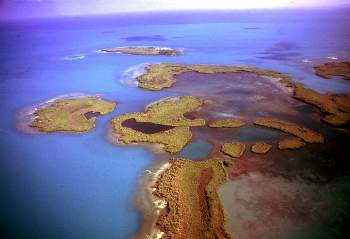Tiempo Climate Cyberlibrary
The Mauritius Declaration on Small Island Developing States

 |
Kanayathu Koshy and Sarah Granich discuss an
international review of the Barbados Programme of
Action for the Sustainable Development of Small
Island States.
Kanayathu Koshy is Director of the Pacific
Centre for Environment and Sustainable Development at
the University of the South Pacific in Suva, Fiji.
Sarah Granich is a freelance consultant and Tiempo
editor, based in Norwich, UK.
|
The International
Meeting to Review the Implementation of the Programme
of Action for the Sustainable Development of
Small Island Developing States (BPOA+10) took place in
Port Louis, Mauritius, 10-14th January 2005.
About 2000 participants, including 18 presidents,
vice-presidents, prime ministers, roughly 60 ministers and
representatives of United Nations (UN) agencies,
journalists from 114 countries and intergovernmental and
non-governmental organizations participated in the
meetings.
The International Meeting was preceded by two days of
informal consultations on 8-9th January to facilitate
preparations for the International Meeting, in particular,
to advance negotiations on the Strategy for the Further
Implementation of the Programme of Action for the
Sustainable Development of Small Island Developing States
(SIDS). The Main Committee for negotiations met from
10-13th January.
Between 10-12th January, the International Meeting held
five plenary panels on the themes of: environmental
vulnerabilities of SIDS, special challenges of SIDS in
trade and economic development, the role of culture in the
sustainable development of SIDS, addressing emerging trends
and social challenges for the sustainable development of
SIDS, and building resilience in SIDS.
During the final two days, the high-level segment of the
International Meeting met to debate the "Comprehensive
Review of the Implementation of the Programme of Action for
the Sustainable Development of SIDS", and to hold
round tables on "The Way Forward", with emphasis
on resource mobilization and capacity building. There were
many side events and partnership activities focusing on the
role of youth, civil societies, community groups, UN bodies
and donor agencies.
By the time the International Meeting was gaveled to a
close, the delegates had adopted the
Mauritius Declaration and the Mauritius
Strategy for the Further Implementation of the
Programme of Action on the Sustainable Development of SIDS
as the major outcomes.
Though the Mauritius Declaration did compromise on a
number of issues, all delegates agreed that they were,
overall, highly satisfied with the result. In particular,
there was agreement that SIDS should be treated as a
"special case" in regards to sustainable
development and a commitment to full implementation of the
United Nations Framework Convention on Climate Change
and further promotion of international cooperation on
global warming.
|

|
The Belize
archipelago
© J Soussan
|
The document that formed the basis for negotiations at
Mauritius was a synthesis product of the Alliance of Small Island
States Strategy Paper
from the Inter-regional SIDS Preparatory Meeting in Nassau,
the Bahamas, 26-30th January 2004. This text was further
considered by the International Preparatory Meeting,
14-16th April 2004, at the UN headquarters in New York,
during the Twelfth Session of the Commission on Sustainable
Development and by informal meetings at the United Nations
in October 2004. The Strategy Paper contained chapters on
the priority areas of the BPOA and identified new and
emerging issues, including the graduation of SIDS from
least developed country (LDC) status, trade, health,
capacity building and culture.
The discussions at the International Meeting led to
agreement on chapters dealing with: natural and
environmental disasters, energy resources, tourism
resources, transport and communication, science and
technology, sustainable capacity development and education
for sustainable development, sustainable production and
consumption, health, knowledge management and information
for decision-making, culture, coastal and marine resources,
land resources, and graduation from LDC status.
Climate change, trade and waste remained thorny issues
for the negotiating groups. During the negotiations, Tuvalu
expressed extreme dissatisfaction with the United States
over its position in refusing to formally participate in
the global strategy to reduce greenhouse gas emissions. The
International Meeting did, however, recognize that climate
change presents a serious threat to SIDS. Gordon Bispham,
Director of the Caribbean
Policy Development Centre said that "all parties
have agreed that climate change is having an effect on
small islands right now and that we need to put policies in
place to reverse this."
Small Island Developing States have argued for many
years that there should be international agreement on the
return of trade preferences for them due to their isolation
and limited resources. These nations have also argued that
for years they have been hampered and constrained by their
limited capacities and have had little assistance from the
global community in being integrated fully into the global
economy. In recognition of these concerns, the Mauritius
Declaration notes that "many Small Island Developing
States either are not represented in Geneva, or are still
grappling with the process of accession to World Trade
Organization membership. Most Small Island Developing
States also experience serious capacity constraints in
meeting World Trade Organization obligations."
Although trade was not as fully acknowledged in the
Declaration as many delegates would have liked, the
Mauritius Declaration does also note that "attention
should be focused on the specific trade and
development-related needs and concerns of Small Island
Developing States to enable them to integrate fully into
the multilateral trading system." "Without some
kind of recompense for the erosion of the trade
preferences, we may as well close shop. It is impossible
for small economies such as ours to compete
internationally," said the Mauritius Chamber of Commerce
representative, Hamid Jhumka. United Nations
Secretary-General Kofi Annan
noted that SIDS would prefer to "trade themselves out
of poverty instead of living on handouts."
On these more contentious issues, the decisions may be
summarized as follows.
Climate change. The Strategy recognizes that the
SIDS are already experiencing "major adverse effects
of climate change" and that "adaptation to
adverse impacts of climate change and sea-level rise
remains a major priority." It also promotes
"increased energy efficiency and development and use
of renewable energy as a matter of priority, as well as
advanced and cleaner fossil fuel technologies."
During the panel discussion on environmental
vulnerabilities, it was stated that in some cases the
choice is limited to remaining on the island/atoll or
seeking shelter elsewhere. While "natural hazards are
inevitable, disasters are not" and efforts must be
intensified to increase the resilience of SIDS. The
environmental vulnerability index launched at the
International Meeting by the South Pacific Applied Geoscience
Commission could be used to assess the vulnerability of
countries to climate-related impacts.
Trade. SIDS negotiated to secure agreement for
special and preferential treatment and for recognition as a
new category of countries in the World Trade Organization.
The final Mauritius Strategy contains references to the
special case of SIDS by prioritizing efforts to integrate
them fully into the multilateral trading system.
Waste. The inclusion of liability issues
regarding the transboundary movement of hazardous waste,
World War II shipwrecks, and transportation of radioactive
material was another highly contentious point in the
negotiations. On the transboundary movement of hazardous
waste, there was agreement for the cessation of such
transport in SIDS region as the "ultimate desired
goal".
During the International Meeting, SIDS continued to
struggle to attract the international support they consider
necessary for their sustainable development.
Since the Barbados Conference in 1994, the focus of the
international agenda has changed with increasing attention
on security concerns, the implementation of the Millennium Development
Goals, and the prioritization of domestic good
governance over governance reforms at the international
level. SIDS wanted to attract attention to their evolving
agenda, including the need to address new and emerging
issues such as the impacts of trade liberalization and
globalization, information and communication technologies,
and health and HIV/AIDS, in addition to the concerns
contained in the Barbados Plan.
The Mauritius Strategy emphasizes that SIDS “are
very vulnerable to natural and environmental disasters with
devastating consequences to their economy, environment and
social life." The Strategy proposed to use the
opportunity of the forthcoming World Conference on Disaster
Reduction in Kobe, Japan, to consider the specific
concerns of SIDS, including in the areas of insurance and
reinsurance arrangements.
Following closely on the tragic impacts of the 26
December Indian Ocean tsunami, the delegates were fully
convinced that the worst fears of SIDS could easily become
realities. As Kofi Annan observed, the small islands
position carried more weight now because of the "shift
in sympathy" by the international community in
response to the magnitude of the tsunami tragedy.
"Even those who had been a bit sceptical about the
impact of global warming cannot say that they have no idea
of the damage water can do," he said.
An encouraging feature of the Mauritius Strategy is the
effort to prioritize support for resilience building and
vulnerability projects, adding social and economic
development considerations to the BPOA and making it
considerably more attractive to donors. Supporting this
recognition, the United Nations Development Programme - the
lead UN agency for the implementation of the Millennium
Development Goals - launched a SIDS Resilience Building
Facility to assist SIDS to develop the capacity to
formulate and implement initiatives to reduce their
vulnerabilities.
|
From the Pacific
At their special retreat in Auckland,
New Zealand, on 6th April 2004, the Pacific Island
leaders adopted their new vision for the Pacific,
which seeks to give all Pacific peoples lives that
are "free and worthwhile". In addition to
economic growth, socio-cultural and environmental
protection, good governance and security were also
recognized as key priorities for bringing about
sustainable development.
Within the Pacific context, the major
concerns in the area of economic development include
negative or low growth and resource depletion. In
social development, there are serious concerns over
rising poverty, declining health and education
standards and facilities and other equity issues.
There are also major environmental issues relating to
pollution, waste management, loss of biodiversity,
and natural disasters. And in governance and
security, the major challenges are around
institutional deficiencies, poor resource management,
political instability, breakdown of law and order,
inequalities, trans-national crime and other human
security concerns.
A Pacific Plan has been developed to
"give effect to" their new vision through
the promotion of "deeper and broader regional
cooperation".
The Pacific is fortunate in that it
already has a strong institutional framework in the
form of regional organizations, institutions and
existing sub-regional bodies, which can be used as a
foundation for broadening and deepening regional
cooperation. It was the view of the leaders that
partnership at different levels must be encouraged to
meet common responsibilities and provide services
cost-effectively, such as: common regional reporting
on international obligations; regional representation
at international level; agreed regional policy
frameworks where needed; common laws and policies;
legal/legislative; technical services; transport
services; research and data; and training and
education.
The Pacific region is noted for its
special governance systems based on traditional ways
and indigenous knowledge and practices that promote
sustainable development in a Pacific way. Judging
from the attention given to culture during the
International Meeting, it is expected that the
Mauritius Strategy will help ensure the survival of
Pacific communities, combining the best of both
worlds.
The challenge now is to mainstream
sustainable development at a time of decreasing
official development assistance to SIDS, declining
foreign direct investment flows, diversion of
development resources to meet new security
obligations, graduation of SIDS from concessionary
resources, and establishment of new trade rules - all
serving to further exacerbate SIDS' growing
vulnerabilities. But as we heard during the World
Summit on Sustainable Development and again at
Mauritius during the International Meeting, it is all
about making it happen by considering measures equal
to the task.
|
There is little doubt that the International Meeting
strengthened partnerships, increased SIDS' ownership of
responsibility over their sustainable development, renewed
and/or reprioritized international community support,
improved SIDS-SIDS and South-South cooperation, increased
UN specialized agency engagement in SIDS issues and
identified new means of implementation, including the
launching of the SIDS University Consortium discussed
below.
On the other hand, some might criticize the
International Meeting's outcomes, noting that the text
does not provide clear direction to other international
organizations and processes, such as the international
financial institutions and multilateral environmental
agreements, and that there were almost no commitments for
new and additional financing or projects at the meeting
apart from addressing vulnerability to disasters, such as
tsunamis.
In the words of Kofi Annan, SIDS will have to deepen
partnerships at all levels - through South-South
cooperation, through closer cooperation with developed
countries, by engaging more actively with civil society,
and by tapping the knowledge and capacities of regional
organizations such as the
Council of Regional Organisations in the Pacific (CROP)
agencies and the Indian
Ocean Commission - in order to effectively implement
the Mauritius Strategy.
There was a clear demonstration of this approach to SIDS
capacity building for the implementation of sustainable
development when the SIDS University Consortium was
launched in the final Plenary. A Memorandum of Agreement
was signed by representatives of five founding member
institutions: the University of Malta, the University of
Mauritius, the University of the South Pacific, the
University of the Virgin Islands, and the University of the
West Indies. The main aim of the consortium is to
strengthen the national capacity of small island states to
implement the Barbados Programme of Action. The Consortium
is expected to improve tertiary level networking through
the promotion of e-learning, participation in the UN Decade
of Education of Sustainable Development initiative and by
conducting targeted SIDS specific research and
training.
At the concluding session, the Secretary-General of the
International Meeting, Ambassador
Anwarul Chowdhury, repeated his call for a dynamic
system of monitoring the implementation of the Mauritius
Strategy. "Monitoring should not conclude with simple
stocktaking, but should be a process by which
implementation loopholes, failures or slackness can be
identified and corrective measures taken," he said.
"With the outcome document now in our hands, we have
to look forward towards the road to implementation. How we
will accomplish this process is in the hands of the
stakeholders - the donor community, the multilateral
financial institutions, civil society, private sector,
regional organizations and the Small Island Developing
States themselves."
Small Island Developing States can take satisfaction
that, ten years after the Programme of Action was agreed
upon, the international community now recognizes the
special circumstances of both their fragile environments
and their fragile economies.
Further information
Kanayathu Koshy, Pacific Centre for Environment and
Sustainable Development, University of the South Pacific,
PO Box 1168, Suva, Fiji. Fax: +679-3-309176. Email:
koshy_k@usp.ac.fj.
Web: www.sidsnet.org/pacific/usp/pace/.
Sarah Granich, Tiempo Editorial Office, School of
Environmental Sciences, University of East Anglia, Norwich
NR4 7TJ, UK. Fax: +44-1603-507784. Web: www.tiempocyberclimate.org/newswatch/.
E-mail: slv.granich@virgin.net.
On the Web
To mark the Mauritius meeting, Tiempo Climate Newswatch has
made available a series of related articles and
documentaries.
The Tiempo Climate Cyberlibrary lists sites covering
Small Island Developing States issues.
A full
report on the proceedings of the International Meeting
is available from Earth Negotiations Bulletin. The conference
website contains documents, webcasts, press releases,
background material and other resources.



